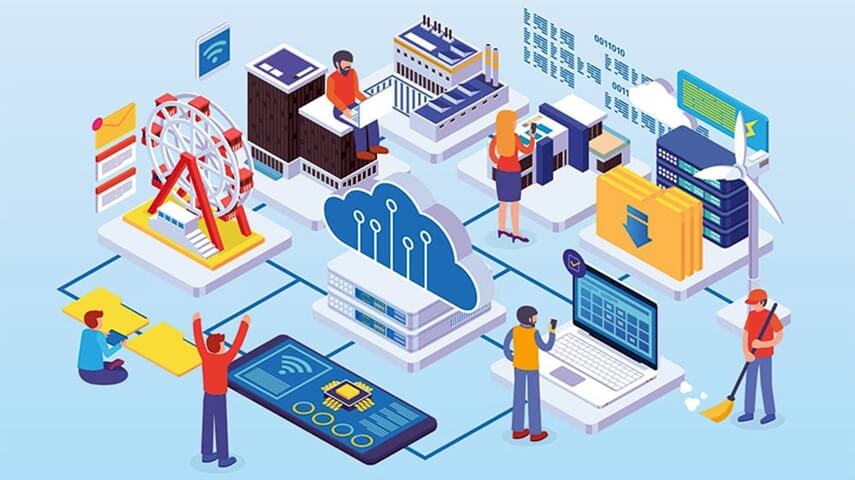Data is frequently referred to as the new oil in today’s digital age, and with good reason. Organizations possess enormous volumes of data that, when properly tapped into and evaluated, can significantly boost corporate success. Incorporating the strength of Big Data analytics into Enterprise Resource Planning (ERP) systems, which have long been a pillar of effective corporate operations, creates a powerful tool for not only managing data but also harnessing it for long-term success.
The Evolution of ERP
Enterprise Resource Planning (ERP) systems have come a long way since their inception in the 1960s. Initially focused on automating back-office functions like finance and HR, modern ERP systems have evolved to encompass nearly all aspects of an organization’s operations. They now offer integrated solutions for supply chain management, Customer Relationship Management (CRM), manufacturing, and more.
ERP systems provide a centralized repository for data generated across various business functions. This data includes everything from sales and inventory figures to employee records and customer interactions. The integration of these functions streamlines processes, reduces errors, and enhances decision-making. However, the real potential of ERP lies in what organizations do with the data it collects.
Big Data Analytics: The Game Changer
Big Data analytics has revolutionized the way businesses handle information. This field involves the collection, processing, and analysis of vast amounts of data to uncover insights, trends, and patterns that can inform strategic decisions. It allows organizations to move beyond traditional reporting and gain a deeper understanding of their operations and customer behavior.
When integrated with ERP systems, Big Data analytics takes the game to a whole new level. Here’s how:
1. Enhanced Decision-Making: ERP systems provide real-time data on various business processes. Big Data analytics can transform this data into actionable insights. For example, by analyzing customer buying patterns, businesses can tailor their marketing strategies for better results.
2. Predictive Analytics: ERP data combined with Big Data analytics can be used to predict future trends and behaviors. For instance, manufacturers can use historical data to forecast demand and optimize production schedules accordingly, reducing waste and improving profitability.
3. Improved Customer Engagement: Understanding customer preferences and behaviors is crucial for enhancing customer experiences. With ERP and Big Data analytics, organizations can personalize marketing campaigns and customer interactions, increasing customer loyalty and retention.
4. Supply Chain Optimization: The supply chain is a complex network of processes. Integrating Big Data analytics with ERP systems can help organizations identify bottlenecks, reduce lead times, and optimize inventory levels, resulting in cost savings and improved service levels.
5. Risk Management: By analyzing historical data and external factors, businesses can identify potential risks and take proactive measures to mitigate them. This is particularly important in industries like finance and insurance.
6. Cost Reduction: Big Data analytics can uncover inefficiencies in various processes, leading to cost reduction opportunities. For example, identifying areas where resources are underutilized can lead to better resource allocation.
Challenges and Considerations
While the integration of ERP and Big Data analytics offers immense potential, it’s not without challenges:
1. Data Quality: The accuracy and reliability of data are paramount. Garbage in, garbage out. Organizations must invest in data cleansing and quality assurance processes.
2. Data Privacy and Security: Handling large volumes of data requires robust security measures to protect sensitive information. Compliance with data privacy regulations like GDPR and CCPA is essential.
3. Talent and Skills: Analyzing Big Data requires a specialized skill set. Organizations may need to invest in training or hire data scientists and analysts.
4. Scalability: As data volumes grow, so does the need for scalable infrastructure and storage solutions.
5. Integration: Integrating ERP and Big Data tools can be complex. It’s essential to have a well-defined strategy and the right technology stack.
The Future of ERP and Big Data Analytics
The convergence of ERP and Big Data analytics is poised to transform how businesses operate and grow. As technology continues to advance, these systems will become more accessible, scalable, and user-friendly. Organizations that embrace this transformation and invest in data-driven decision-making will have a significant competitive advantage.
In conclusion, ERP and Big Data analytics are not just tools for managing data; they are tools for leveraging data to drive growth and innovation. By combining the structured data from ERP systems with the unstructured data from various sources, organizations can gain a holistic view of their operations and customers. This, in turn, enables them to make more informed decisions, optimize processes, reduce costs, and ultimately, achieve sustainable growth in today’s data-driven world.



